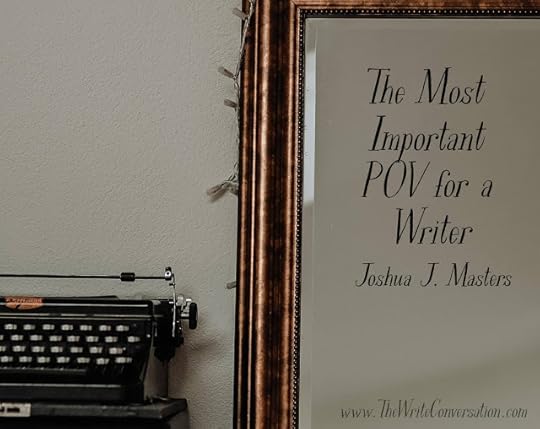The Most Important POV for a Writer

by Joshua J. Master @JoshuaJMasters
Although I have a Christian Fantasy novel buried in the depth of my imagination, crying out from the dungeon of my mind to take flight on wings of dragons, I’m primarily a nonfiction writer. So, I struggled with learning point of view (POV) writing, especially deep POV. It’s an important skill to learn, but if we want our writing to make a difference, there’s a POV even more important than our character’s and deeper than a clever scene setting that we need to master. Our writing can only have a lasting impact if we’re willing to evaluate our own point of view and where it comes from.
Recent events in our culture have highlighted this concept as our nation faced arduous days of suffering with a life-altering pandemic, racial unrest, and political uproar. Have you noticed many of the people you know have vastly different views on these issues? You probably have, since many of them have made their point of view well known.
People are screaming their opinions through worn keyboards with rash and unedited thoughts—many of which need editing, both in their attitude and grammar.
Their goal is to force a view on the reader rather than understand their reader.
I point this out not to make a political statement, but to illustrate how our personal point of view can obscure the sincerity of our craft.
Agenda always deflates sincerity.
The way we respond to any situation greatly depends on our experiences and past hurts. Our personal POV develops from our pain and fears. POV could stand for Pain on View, making it virtually impossible for us to see someone else’s point of view unless we actively seek it out. Our POV is deep-rooted and unshakable without practice and training.
How does that affect our writing? Well, we tend to believe everyone has (or should have) the same point of view we do, so we write from that perspective. But they haven’t had the same experiences or hurts we’ve endured. Everyone sees the world through a broken lens, but our lenses have been created and broken differently, so we never see a situation the same way.
When our writing is informed by a single POV, it becomes bland and uncolored. Every character at her core will be the same. Worse, our writing will have less universal appeal because we’ll unknowingly exclude others from identifying with what we’ve written.
That’s not to say we write to please everyone, but rather in the practice of writing we strive to understand others. That requires us to study and even challenge our preconceived opinions, agendas, and feelings that make up our point of view.
Without studying our thoughts and emotions, we blindly surrender to them, never realizing we’ve become a slave to our own experiences.
When we write historical fiction, we research the period.When we write legal thrillers, we research the law.When we write comfy mysteries, we research our plot twists.When we write Bible studies, we research Scripture.
But it all falls flat if we’re unwilling to test: Our own history, Our own forms of legalism, Our own thinking forged by the plot twists in our lives,And our own place in God’s Word.
Are we willing to examine our own POV and work toward a greater understanding of someone else’s to enrich our writing? Because that propels the craft of writing from an agenda-based activity to a culture-changing art.
Writing that meets the hearts of many requires an understanding of many.
May we challenge ourselves and one another to examine our own point of view, heal from our past hurts, and write with a purpose greater than our own emotions.
TWEETABLE
The Most Important POV for a Writer - @JoshuaJMasters on @EdieMelson (Click to Tweet)
 Joshua J. Masters is a pastor, author, and speaker. He’s been featured on CBN Television, HIS Radio, and the Light Radio Network. Josh is the author of American Psalms: Prayers for the Christian Patriot and is a contributing author for Feed Your Soul, Refresh Bible Study Magazine, and One Christian Voice. Josh has also worked as an actor and crew member in the film industry (SAG/AFTRA) and continues to have a passion for film. He lives with his wife, Gina, and Franklin the Pup outside Greenville, South Carolina where he serves as a speaking and care pastor.
Joshua J. Masters is a pastor, author, and speaker. He’s been featured on CBN Television, HIS Radio, and the Light Radio Network. Josh is the author of American Psalms: Prayers for the Christian Patriot and is a contributing author for Feed Your Soul, Refresh Bible Study Magazine, and One Christian Voice. Josh has also worked as an actor and crew member in the film industry (SAG/AFTRA) and continues to have a passion for film. He lives with his wife, Gina, and Franklin the Pup outside Greenville, South Carolina where he serves as a speaking and care pastor.Josh would love to connect with you on his website, www.joshuajmasters.com or engage with you on Facebook, Twitter, Instagram, or Goodreads.
Published on June 11, 2020 22:00
No comments have been added yet.



